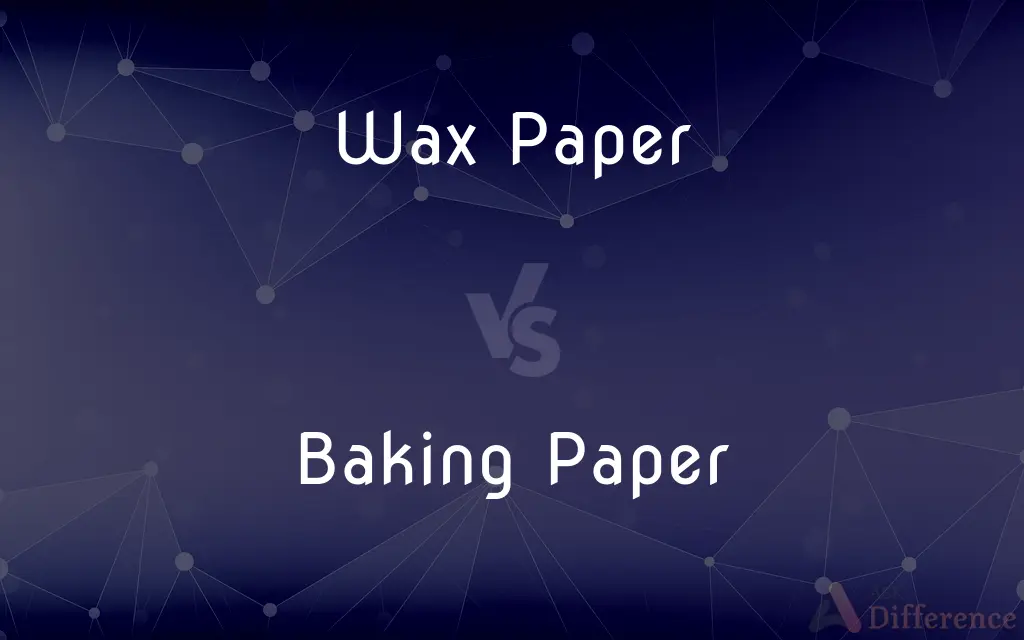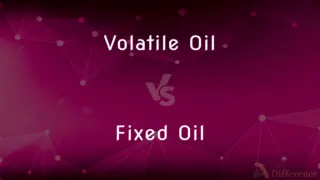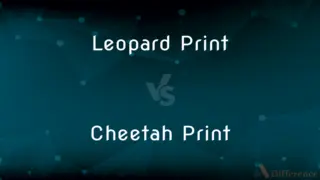Wax Paper vs. Baking Paper — What's the Difference?
By Tayyaba Rehman — Published on November 20, 2023
Wax Paper is coated with a layer of wax, preventing food from sticking but not heat-resistant. Baking Paper, or parchment paper, is heat-resistant, ideal for oven use.

Difference Between Wax Paper and Baking Paper
Table of Contents
ADVERTISEMENT
Key Differences
Wax Paper, with its waxy coating, serves as a moisture barrier, making it perfect for wrapping foods or for tasks in the kitchen that don't involve heat. Baking Paper, on the other hand, is treated to withstand high temperatures, ensuring it doesn't burn or affect food flavors during baking.
Both Wax Paper and Baking Paper offer non-stick surfaces, but where Wax Paper falters in the face of heat, Baking Paper shines. While it's a mistake to put Wax Paper into the oven, Baking Paper is the chef's friend for pastries, cookies, and more.
Wax Paper's main advantage is its cost-effectiveness and moisture-resisting properties, helping to keep items fresh. Baking Paper, however, champions in the domain of baking, ensuring even cooking without sticking.
For those who prioritize eco-friendliness, some Baking Paper variants are compostable. Wax Paper, with its wax coating, doesn't boast the same environmental credential. However, in the realm of food presentation or craft, the translucent nature of Wax Paper is often favored over the opaque Baking Paper.
Comparison Chart
Heat Resistance
Not heat-resistant
Heat-resistant
ADVERTISEMENT
Primary Use
Wrapping, non-heat tasks
Baking
Translucency
Translucent
Opaque
Coating
Waxed
Silicone or quilon coated
Environmental Friendliness
Not typically compostable
Often compostable
Compare with Definitions
Wax Paper
Wax Paper is not suitable for oven use.
Mistakenly, I placed Wax Paper in the oven, and it smoked.
Baking Paper
Baking Paper is also known as parchment paper.
I couldn't find Baking Paper, but parchment paper was available.
Wax Paper
Wax Paper is moisture-resistant.
Use Wax Paper to cover the dough, ensuring it doesn't dry out.
Baking Paper
Baking Paper ensures non-stick cooking.
The cake came out perfectly using Baking Paper.
Wax Paper
Wax Paper is translucent.
The cookies' silhouette was visible through the Wax Paper.
Baking Paper
Baking Paper is heat-resistant paper used in baking.
I lined the tray with Baking Paper for easy cookie removal.
Wax Paper
Wax Paper is a paper coated in a thin wax layer.
I wrapped the sandwich in Wax Paper to keep it fresh.
Baking Paper
Baking Paper can be compostable.
I prefer compostable Baking Paper for environmental reasons.
Wax Paper
Wax Paper prevents food from sticking.
The candy didn't adhere thanks to the Wax Paper underneath.
Baking Paper
Baking Paper withstands high oven temperatures.
I baked at 450°F, and the Baking Paper held up brilliantly.
Wax Paper
Alternative form of wax paper
Common Curiosities
What's the main use for Wax Paper?
Wax Paper is mainly used for wrapping and tasks that don't involve heat.
Can I use Wax Paper for crafts?
Yes, Wax Paper's translucency makes it popular for crafts.
Can I use Wax Paper in the oven?
No, Wax Paper is not heat-resistant and can smoke or catch fire.
Is Baking Paper the same as parchment paper?
Yes, Baking Paper is often referred to as parchment paper.
Does Baking Paper affect the taste of baked goods?
No, Baking Paper is designed not to impart flavors or odors.
Why is Wax Paper not suitable for baking?
The wax coating can melt and smoke when exposed to high temperatures.
Can Baking Paper be reused?
While possible, it's best to use a fresh piece for optimal non-stick performance.
How does Wax Paper prevent sticking?
It has a waxed surface that acts as a barrier between foods.
Is Baking Paper recyclable?
Some types are, especially if free from food residue, but many are also compostable.
Is there a cost difference between Wax Paper and Baking Paper?
Typically, Wax Paper is less expensive than Baking Paper.
Share Your Discovery

Previous Comparison
Volatile Oil vs. Fixed Oil
Next Comparison
Leopard Print vs. Cheetah PrintAuthor Spotlight
Written by
Tayyaba RehmanTayyaba Rehman is a distinguished writer, currently serving as a primary contributor to askdifference.com. As a researcher in semantics and etymology, Tayyaba's passion for the complexity of languages and their distinctions has found a perfect home on the platform. Tayyaba delves into the intricacies of language, distinguishing between commonly confused words and phrases, thereby providing clarity for readers worldwide.












































